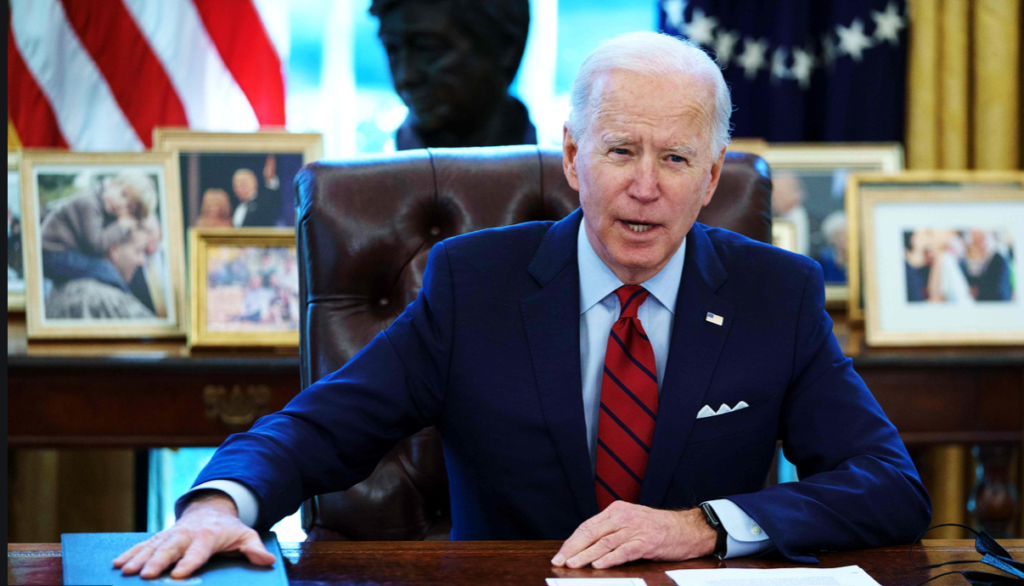As Congress Negotiates Stimulus, Biden Ties Up Loose Ends In Homeland Security & Diplomacy

Image Courtesy of NBC News
By Justin Lamoureux
Washington’s most noteworthy accomplishment this week undoubtedly comes in the form of progress on the development of a COVID-19 stimulus package. While Congress devoted considerable time to negotiate the specifics of Biden’s $1.9 trillion package, the administration itself worked on addressing matters related to national security and foreign policy.
President Biden took a step towards leniency this week by extending protective status to thousands of Venezuelan migrants living in the United States. In doing so, his administration postpones the deportation of 320,000 people. This protective status lasts 18 months; eligible individuals have 180 days to apply and must pay a fee of $545 to receive authorization to stay and work in the U.S.
The U.S. recognizes Venezuela’s National Assembly – first elected in 2015 – as the country’s last remaining democratic institution. Likewise, Assembly President Juan Guaido is considered Venezuela’s legitimate head of government. Upon being elected, Guaido defied President Nicolas Maduro – whose Socialist Party controls nearly every government institution – by taking office and has since led efforts to depose the country’s authoritarian regime. Under Maduro’s leadership, Venezuela has struggled with food shortages, hyperinflation, and political repression. Biden’s decision to extend protective status to Venezuelans who have sought refuge in the U.S. received a positive reception from members of both parties.
On a similar note, the administration is working to address a surge of undocumented children on the southern border. Currently, 3,250 migrant children are in custody along the U.S.-Mexico border. After being taken into custody, many are staying in holding cells longer than the maximum of 72 hours allowed by law. The influx of border crossings has made it difficult for officials to find facilities where children could be transferred so they can have access to healthcare, education, and lawyers.
U.S. law dictates that migrant children are separated from the adults they arrive with – generally parents, older siblings, or other relatives – until federal officials can confirm the accompanying adult is their relative. This procedure is designed to protect minors from human traffickers and grant them legal protections and is different from the Trump administration’s “zero-tolerance” policy that separated young children from their parents. White House Press Secretary Jen Psaki affirms that President Biden and his administration are prioritizing this issue.
Homeland security is not the only realm in which the Biden Administration had an eventful week – Internationally, Biden is seeking to expand the Afghan peace drive in a new policy initiative. Prior to leaving office, the Trump Administration had promised to remove all 2,500 U.S. troops from Afghanistan by May 1. Secretary of State Antony Blinken noted this option “is still on the table,” along with several more options. The United Nations is being encouraged to convene talks with a dozen other countries – including Russia, China, and Iran, the United States’ top geopolitical rivals – regarding a collaborative approach to facilitating peace in Afghanistan. Nevertheless, questions remain as to whether these political superpowers can find common ground on this issue.
The Biden Administration’s proposal includes the formation of a “transitional peace government,” with the presidents and vice presidents selected by the two parties (i.e, the U.S. and Afghanistan). It also calls for an immediate cease-fire on all sides. Introducing a sustainable peace deal in Afghanistan would be crucial to ensuring amicable long-term political development. Given the difficulties that past administrations have faced in doing so, this would likely bode well for the Biden Administration should it prove successful.
The affairs which represented the Administration’s primary focus over the last week might seem irrelevant compared to the ongoing pandemic, but such matters could have long-term political implications. Extending protective status to Venezuelan migrants – a growing community in Florida – could help create a political climate that is more sympathetic towards refugees. By the same token, working to address ongoing deficits in the treatment of migrants who are not legally protected can help initiate significant reforms on immigration policy. Perhaps most importantly, though, any progress regarding the turbulent political climate in Afghanistan would be an important step in the right direction. The previous two presidents have vowed to withdraw troops – and, in doing so, usher in reform – but have struggled to do so. Should Biden accomplish this, it would play a significant role in defining U.S. foreign policy moving forward. On all three fronts, the Biden Administration is seeking to position itself as an outlet for change; the extent to which said reforms can be pursued has yet to be seen.





